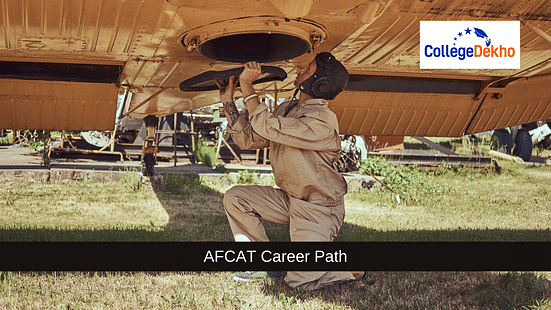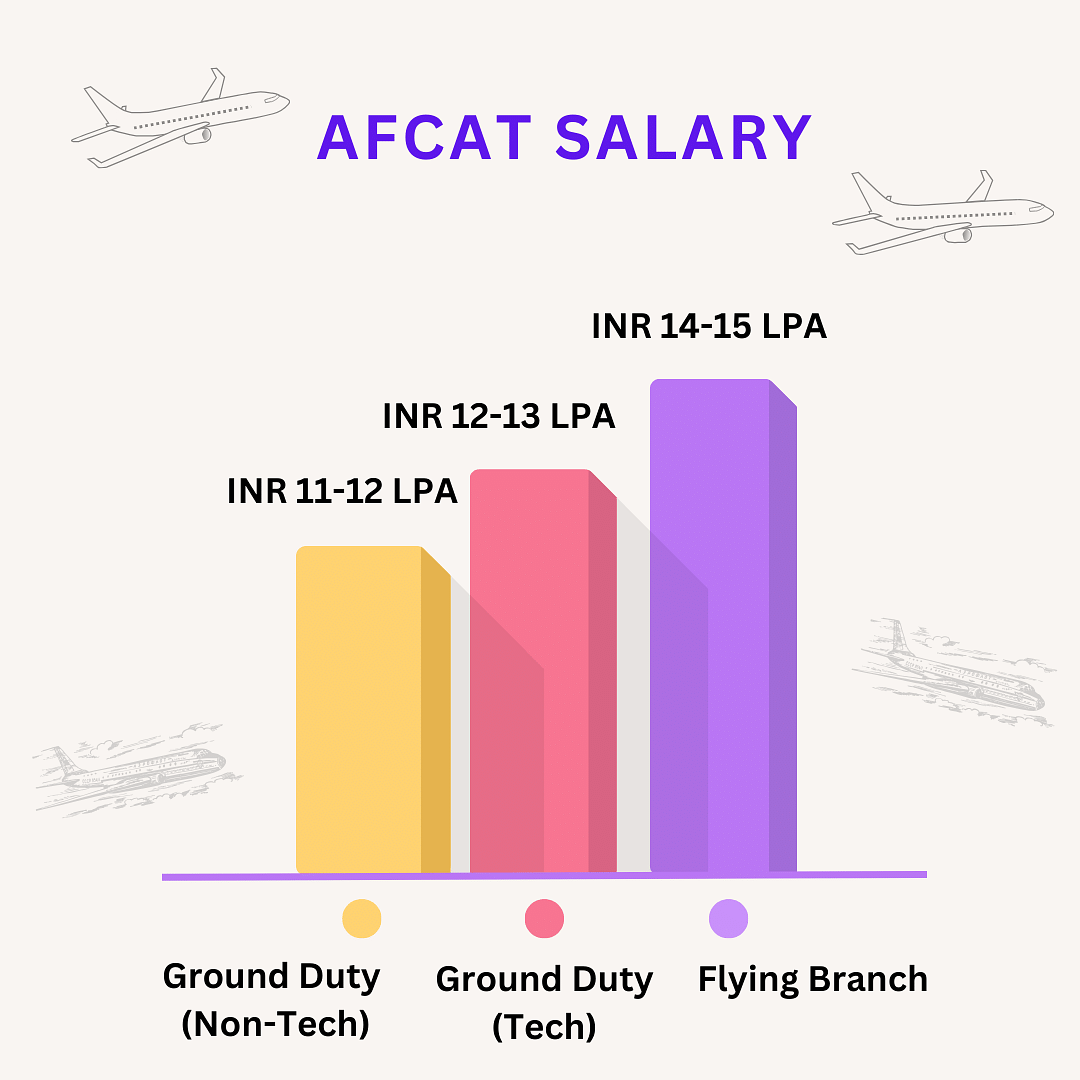
AFCAT Career Path and Salary: With the motto of “Touch the sky with Glory”, making a career in the Indian Air Force is every student’s dream. The Indian Air Force conducts Air Force Common Admission Test (AFCAT) twice a year for students. Students who want to make a career can apply for AFCAT entrance exam. Students can opt for the different AFCAT career paths according to their education level. AFCAT opens the door to the patriotism, honour, adventure, and passion of the students in the Indian Air Force. Once a Student becomes a part of the Indian Air Force family, they can serve the Air Force as well as avail of the facilities and benefits.
When completing AFCAT 2025 application form , student must specify their preferred branches to join after AFCAT selection process . Students need to achieve a high score on the written test to receive an invitation for Air Force Selection Board (AFSB) interview . During this stage, they can select their preferred AFSB location and interview date. To become part of the Air Force, Students must receive a recommendation from one of the selection boards and pass a medical examination.
If you are looking to make a career in the Indian Air Force, then read the article to know AFCAT career paths, eligibility, salaries, job profiles, and other details.
After passing the AFCAT, students get rigorous training at the Air Force Academy, which prepares them for positions such as pilots, engineers, administrators, and others. The Indian Air Force (IAF) career path provides numerous options for advancement, such as specialised training, promotions, and leadership roles, as applicants gain experience and demonstrate their abilities. Salaries in the IAF are structured according to the pay scale established by the government.
A newly commissioned officer's beginning salary is normally around Rs 56,100 per month (under Level 10 of the 7th Pay Commission), plus additional allowances such as flying pay, housing rent allowance (HRA), and transportation allowance. With rank advancement (from Flying Officer to Squadron Leader and beyond), the compensation can dramatically increase, reaching Rs 1,00,000 or more per month for higher positions, along with benefits such as medical facilities, pensions, and other bonuses. The career also provides job security, prestige, and the opportunity to serve the country.
Also Read:
AFCAT Career Path: Quick Overview
Students who want to make a career in AFCAT should know the important things about the exam. Here are the basic details of AFCAT entrance exam.
AFCAT Career Path Overview | |
|---|---|
Exam Name | Air Force Common Admission Test |
Exam Level | National Level |
Conducting Body | Indian Air Force |
Exam Purpose | To select Students for Flying Branch and Ground Duty in Indian Air Force |
Frequency | Twice a year |
Exam Mode | Online Mode |
Various AFCAT Career Paths
The Air Force offers a variety of opportunities to make a career in AFCAT. It is a very exciting career to pursue which offers great opportunities and future prospects. If you are someone who has the zeal to serve the country with an adrenaline rush, this career is the right fit for you.
Indian Air Force offers job opportunities in both technical and non-technical branches through AFCAT exam. Here is the list of AFCAT career paths.
Career Path 1: After Graduation
Indian Air Force grants various opportunities to both Men and Women Students to make a career through AFCAT exam. Students who are already graduates and willing to make a career can appear in AFCAT exam. Once the Students pass the entrance exam, they will be required to appear in the training and interview process at Air Force Academy.
Career Path 2: After Engineering
Students who have completed their Engineering graduation can make a career through AFCAT. Indian Air Force calls for enthusiastic Students and engineers to handle the engineering department. Students can apply for AFCAT application and CDS exams to make a career through AFCAT after Engineering.
Career Path 3: After Post Graduation
Students can also make a career through AFCAT and this includes both male and female Students between the age of 20-24 years. Students can work for the Indian Air Force after post-graduation through AFCAT exam.
AFCAT Career Path: Educational Qualification
The education qualifications and eligibility criteria for AFCAT 2025 depend on the branch you are applying for. The Flying branch and ground duty branch (Technical and non-technical) have different qualification requirements. AFCAT branch-wise educational qualification is given below:
Flying Branch AFCAT Qualification:
- Students who are applying for Flying Branch must have passed with a minimum of 60% marks in the 12th class. The students must have Maths and Physics as compulsory subjects in the 12th class.
- Students must have a graduate degree in BE/BTech or cleared section A and B exams of Associate Membership of the Institution of Engineers (India) or Aeronautical Society of India.
Technical Ground Duty AFCAT Qualification
- Students must have completed 4 years of graduation degree in Engineering or integrated post-graduation in Engineering/ Technology from a recognised university.
OR
- Students must have cleared Sections A and B examination of Associate Membership of the Institution of Engineers (India) or Aeronautical Society of India or the Graduate membership examination of the Institution of Electronics and Telecommunication Engineers.
- Students must have passed the 12th class from a recognized board with a minimum of 60%.
Non-Technical Ground Duty AFCAT Qualification
- Students who are applying for the non-technical branches through AFCAT must have completed graduation such as LLB, BSc, MCA, etc.
- Students must not have any backlog while applying for AFCAT exam. Final-year students are also eligible to apply for AFCAT exam.
- Students must have passed the 12th class from a recognized board with 60% marks.
AFCAT Career Path: Required Skills
The Air Force is a field where heroes belong. To make a career in the Air Force through AFCAT, there are some required skills in a Student. Being extremely bright students, the Students should be able to lead. They also require the ability to motivate yourself and others in their time of need. Here are some skills mentioned below that an AFCAT aspirant should possess.
Skills Required for AFCAT Career Path | |
|---|---|
Leadership | Motivativating and Inspiring nature |
Decision Maker | Management skills |
Teamwork | Communication skills |
Strategic Mind | Confident |
Dynamic thinking | Quick Learner |
AFCAT Career Path: Career Opportunities
Students can make a career in the Air Force through AFCAT, and there are various career opportunities for the students. Students can make a career in the Flying Branch, Technical Branch, and Non-Technical Branch according to their interests and educational qualifications. The career options in AFCAT career path are mentioned below.
Career in Flying Branch
The Students can make a career in Flying Branch in different departments, which include:
- Fighters
- Transports
- Helicopters
Career in Technical Ground Duty
Students who have graduated in Engineering can opt for the Technical duties, which are:
- Mechanical
- Electronics
Career in Non-Technical Ground Duty
Students who want to make a career in the Air Force through a non-technical branch can opt for different departments according to their educational qualifications. The departments for the non-technical branch are:
- Weapon Systems
- Administration
- Accounts
- Logistics
- Education
- Meteorology
AFCAT Career Path: Job Profile
AFCAT provides students with different job profiles depending on their interests. The table shows the job profile for various branches of IAF:
Branch | Description |
|---|---|
AFCAT Flying Branch |
|
AFCAT Ground Duty (Technical) |
|
AFCAT Ground Duty (Non-Technical) |
|
AFCAT Career Path: Salary
After students qualify AFCAT they are given training depending on the role. The AFCAT training period salary is Rs 56,100 per month, which aspirants earn as a stipend. After completion of the training, the Student's salary is fixed in the first cell of Level 10. Each Indian Air Force branch receives a different salary.

Check below the annual package of each department:
Branch | Average Salary Package Per Annum (In Rs) | Average Salary Per Month (In Rs) |
|---|---|---|
Flying Branch | 14,00,000 -15,00,000 | 1,08,000 |
Ground Duty (Tech) | 12,00,000-13,00,000 | 95,262 |
Ground Duty (Non-Tech) | 11,00,000-12,00,000 | 85,262 |
However, with experience and performance, Students gain promotion to higher positions. If a Student has worked as a Flying Officer for three years, they will be further promoted to Flight Lieutenant. Also, to secure a promotion within the department, students have to appear for departmental tests. To be eligible for a departmental promotion the officer-ranked Students have to sit for C examinations. The C examination syllabus includes General Knowledge and post-related topics for departmental promotion and for securing promotion in ranks.
Read More: AFCAT Salary 2025
AFCAT Career Path: Perks and Additional Benefits
Beyond their title, AFCAT officers enjoy attractive salary packages and a range of facilities. Their compensation includes allowances for housing, transportation, and daily meals, contributing to an improved quality of life. The government ensures comprehensive medical benefits for AFCAT officers, prioritizing their health and fitness for service.
AFCAT career path offers officers opportunities for advancement within the Indian Air Force. The IAF organizes various training programs to enhance officers' knowledge and skills, serving as a motivational factor. Additionally, AFCAT officers are eligible for a pension plan upon retirement, ensuring a comfortable life beyond their tenure in the Air Force. Explore the perks and benefits offered to officers in the Indian Air Force below.
Particulars | Details |
|---|---|
Educational Benefits |
|
Scholarships and Welfare |
|
Insurance |
|
Loan facility |
|
Placement cell |
|
Medical Allowances |
|
Post-retirement Benefits |
|
Other benefits |
|
Read More: AFCAT Physical and Medical Standards
With variable perks and benefits, students who choose to build a career in the Air Force must start gearing up from the day they decide to go for this career path. Hope this article helps you realise that whatever you have chosen, must be out of your interest.
Stay tuned with
CollegeDekho
for more updates about AFCAT exam!
Are you feeling lost and unsure about what career path to take after completing 12th standard?
Say goodbye to confusion and hello to a bright future!

FAQs
The AFCAT application does not specify the exact physical fitness tests. However, candidates selected for the AFSB interview will probably face physical challenges like running, push-ups, and maybe chin-ups or rope climbing. It is a good idea to maintain a high general fitness level to prepare for these tests.
The educational requirements for the AFCAT differ based on the career path you choose:
- Flying Branch: You need a bachelor's degree and must have studied Physics and Mathematics in your 10+2.
- Technical Ground Duty: A bachelor's degree in Engineering (BE/BTech) or a B.Sc in Physics and Mathematics is required.
- Non-Technical Ground Duty: A bachelor's degree in any discipline from a recognised university is necessary.
The AFCAT selection process consists of three stages:
- Stage 1: Online Computerized Test (CBT)
- Stage 2: Air Force Selection Board (AFSB) Interview
- Stage 3: Medical Examination
The Indian Air Force offers several fascinating and difficult career opportunities, all of which may be accessed through the AFCAT test. Following the AFCAT exam, the most sought-after careers include those of a pilot, navigator, air traffic controller, ground duty officer, and engineering officer. These are only a handful of the numerous fascinating and demanding employment choices open to AFCAT-approved applicants.
An invitation to the AFSB interview is extended to candidates who pass the AFCAT exam. Candidates who receive a recommendation from the AFSB interview must consent to a medical exam. Candidates are then invited to train at the Air Force Academy after the IAF creates a merit list for the AFCAT Selection Procedure.
The position of Air Marshal in India has the highest pay after passing the AFCAT exam in India. After the Air Chief Marshal and the Air Vice Marshal, the Air Marshal is the third-highest position in the Indian Air Force. In the IAF, an Air Marshal makes around 30 LPA. Additionally, they are given a range of allowances, including home, travel, and medical allowances. The quantity of these allowances varies according to the officer's seniority and rank.
After clearing the AFCAT exam in India, if you are chosen to join the Indian Air Force, your beginning pay will be about INR 56,100 per month. The starting rank for all officers in the IAF is Flying Officer, and this is the pay scale for that position. Your pay will rise as you advance in your profession.
Depending on your interests and aspirations, many graduations in India are excellent for launching a career after passing the AFCAT exam. But among AFCAT applicants, some of the most popular degrees are in engineering, science, commerce, and the arts. The graduation that will allow you to follow your interests and aspirations is ultimately the finest graduation for beginning a profession after the AFCAT exam.
Was this article helpful?


















Similar Articles
NCHMCT JEE 2025 Application Form Correction: Important Dates, Details to be Edited
Documents Required to Fill NCHMCT JEE 2025 Application Form: How to Upload, Specifications & More
Top 10 Air Hostess Training Institutes in India 2025
NCHMCT JEE 2025 Login: Application Number & Steps to Retrieve Password
NCHMCT JEE 2025 Exam Centres: State-wise List, City Intimation Slip
Last Minute Tips for NCHMCT JEE 2025